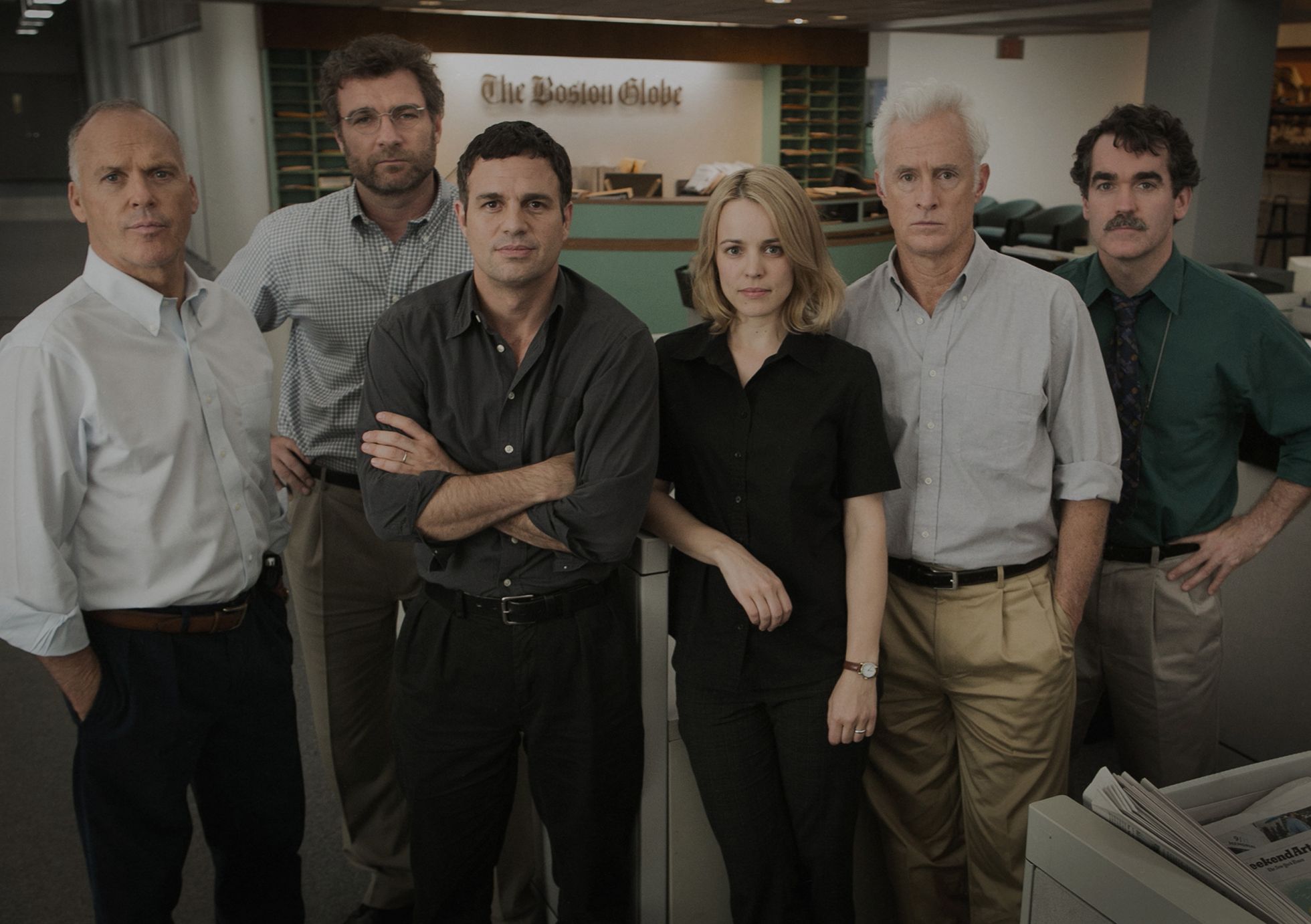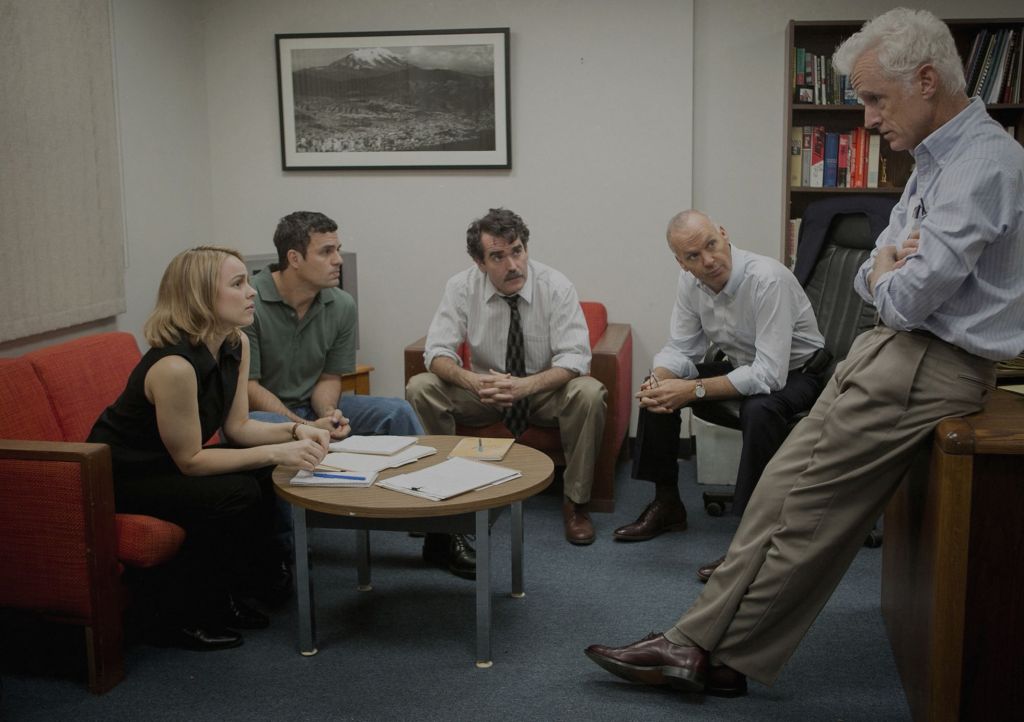Translating deep thinking into common sense
Spotlight on our Freedom—to Question even the “Sacred”

By Walter Donway
November 29, 2015
SUBSCRIBE TO SAVVY STREET (It's Free)
When the evils of a powerful institution, able to punish its detractors, are attacked by its enemies, it is dramatic. When the same institution, for the same evils, is attacked by those who loved it and depended upon it, it is heroic.
When the evils of a powerful institution, able to punish its detractors, are attacked by its enemies, it is dramatic. When the same institution, for the same evils, is attacked by those who loved it and depended upon it, it is heroic. Spotlight, the recently released movie about the most devastating exposure in modern times of the evils of the Roman Catholic Church, rises to heroism.
In a scene that establishes the conflict, members of the “Spotlight” team of reporters for the Boston Globe, who conducted the investigation of pedophilia by Boston priests and brothers that shook the Church worldwide, one by one confess their relationship with the Church. They may be “lapsed,” “non-attending,” or “non-practicing,” but all were reared in the Church and had reverence for it.
Established in the middle of the 19th century and owned by wealthy Protestants, the Globe‘s staff by 1890 reflected the composition of ambitious young immigrants to Boston: it was predominantly Irish Catholic. And that is reflected, today, in the team of reporters and editors (played by Michael Keaton, Rachel McAdams, Mark Ruffalo, and John Slattery), who cracked the story of sexual abuse, got the story against the resistance of a city devoted to the Church, and won for the Globe the 2003 Pulitzer Prize for Public Service.
In the movie, the reporters are the perfect team, pounding the pavement for interviews with “survivors” of the abuse—many had killed themselves outright, or by alcohol or drugs—and scanning the thousands of pages of listings of Archdiocese priests for clues. “Sick leave,” “transfer,” and “in treatment” had become euphemisms for steps by Bernard Cardinal Law, Boston’s archbishop, to keep the scandal under wraps. Lawyers were both the earliest heroes (Mitchell Garabedian, powerfully portrayed by Stanley Tucci) and a big part of the problem (dozens of cases were settled by the Church without ever going to court).
As the reporters break the story, including by some dramatic interviews with victims, the bitter implications for the Church, the damage done, and the complicity of the entire Boston community become real to them. The relentless search for truth becomes personally agonizing and the movie hits its high note of inner conflict—and heroism.
To launch an attack on your creed, the commitment of a lifetime, is to attack old friends, colleagues, teachers, and parents: This is the pressure that bears down on the reporters and editors.
To launch an attack on your creed, the commitment of a lifetime, is to attack old friends, colleagues, teachers, and parents: This is the pressure that bears down on the reporters and editors. Sometimes, the pressure is a “friendly” chat at a bar—“You’ll still be Boston when the editor who assigned this is long gone”—in some it is a mother whose life is the church—in some it is stark realization that neighborhood kids are being “looked after” by a priest on the list of suspects.
Some of the priests in Boston were accused and convicted of abusing as many as 130 boys and girls; when the story finally appeared in the Globe, in headlines and page after page of documentation and dramatic stories, some 1,000 additional victims telephoned the Globe reporters. Priests in Boston went to jail; the Archdiocese came close to bankruptcy with the settlements; and Cardinal Law resigned and was appointed to a highly prestigious position at the Vatican. In the wake of the Globe story—ultimately, hundreds of stories—victims all over the world dared to come forth and accuse their abusers. At the end of Spotlight, a list runs down the screen of more than a hundred U.S. cities and a hundred or more cities worldwide where major abuse scandals of the Church of Rome erupted.
 From what I am able to check, Spotlight strives for veracity. For example, at the Globe for years and decades Irish Catholic editors downplayed the extent of the abuse. A single Globe columnist, Eileen McNamara, refused to let it drop, speculating on implications of the evidence, demanding answers. And it is a new Jewish editor-in-chief, (played by Liev Schreiber, who is “Ray” in the TV series on Boston “Southie,” Ray Donavan), who suggests in no uncertain terms that the “Spotlight” investigative team needs to take McNamara’s column seriously and get some answers.
From what I am able to check, Spotlight strives for veracity. For example, at the Globe for years and decades Irish Catholic editors downplayed the extent of the abuse. A single Globe columnist, Eileen McNamara, refused to let it drop, speculating on implications of the evidence, demanding answers. And it is a new Jewish editor-in-chief, (played by Liev Schreiber, who is “Ray” in the TV series on Boston “Southie,” Ray Donavan), who suggests in no uncertain terms that the “Spotlight” investigative team needs to take McNamara’s column seriously and get some answers.
I suspect that the movie script was approved and endorsed, at least implicitly, by the Globe, which is not wrong, but probably desirable. The Globe ran a feature with photographs of the Spotlight actors arm-in-arm with the reporters and editors they portray.
If you can comprehend the sense of betrayal, of hideous hypocrisy, felt by Roman Catholics when they learned from the Globe that the sexual abuse was not “a few bad apples,” but systemic in the contemporary church, then you might think that across the sky would be blazoned: “Why? Why would priests, of all people, do this?”
I don’t have the impression that this question was seriously enough asked or became urgent enough in the aftermath of the revelations. A strength of Spotlight is that it addresses the question in a manner integral to the plot and action. The reporters become aware of a book by a psychotherapist once involved with a treatment center for priests, and who for decades has studied the priests involved. This crucial character, presented as a voice on a speaker phone, gives his informed estimate that some six percent of priests nationwide may be involved in abuse—and this estimate turned out to be accurate in Boston. And, addressing the unasked question, he explains that the requirement that priests of the Roman Catholic Church commit to lifelong celibacy has resulted in some half of priests engaging in illicit sex—and a percentage of them abusing children in their charge.
The movie does bear down on the question: What is systemically wrong with the Church? There is little emphasis on the inherent pathology in the anti-materialistic, anti-body, and anti-sexual doctrine of the Church.
That information shapes the investigation but not the exposé as reported. The movie does bear down on the question: What is systemically wrong with the Church? The team, however, goaded by the Globe’s new editor-in-chief, takes this to mean they must prove that the abuse involves the Archdiocese hierarchy, right up to Cardinal Law. There is little emphasis on the inherent pathology in the anti-materialistic, anti-body, and anti-sexual doctrine of the Church.
That is not the task, the heroic achievement, celebrated in this film. The achievement is to pursue the truth, against intimidation and in the face of personal anguish, and to put it on the record. And that is powerful indeed. In the end, it is why an institution like the Church of Rome ultimately may not survive, at least in any recognizable form, in a society with freedom of speech and press. Circumstances, tradition, and power can delay revelation of the truth for a very long time, but when revealed and understood, it may be fatal.
There is a tradition of fine movies about newspaper crusaders, like Citizen Kane. Spotlight is in that tradition, but, if anything, more poignant. To question one’s ideas, including the role of faith, is man’s fundamental act of freedom. The anguish in the faces of the reporters as they discover the truth they seek expresses the price we may pay for that choice.








Interesting. I’ll look out for “Spotlight” if it comes to our theater in Malta. But it won’t be popular here because 99% of the population is Catholic ha ha.
Interesting to hear your comment, lawless. I never have been to Malta but at least one of my favorite novels is set there. I didn’t realize that it was THAT Catholic.